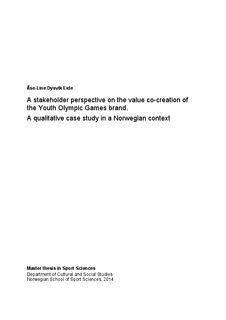| dc.description.abstract | The purpose with this case study research has been to understand the stakeholders’
perception of the Youth Olympic Games brand (YOG), in a Norwegian context. The
research was conducted from a marketing perspective using a framework by Helm and
Jones (2010) to illustrate how the value co-creation of the YOG brand may work.
Eleven stakeholders from various stakeholder groups were interviewed based on their
experience with the YOG.
The three research questions for this thesis were:
1. Are the stakeholders of the YOG co-creating the brand?
2. Has the YOG achieved brand equity?
3. Has the extension of the Olympic brand been a success?
Parent, Kristiansen, Skille and Hanstad (2013) identified the most salient stakeholders
of the Innsbruck YOG, and these were used to contact stakeholders in a Norwegian
context. The research indicates that the majority of the stakeholders’ co-create value to
some extent. The full value co-created is unclear due to vague expectations of the brand
delivery among stakeholders. Their level of brand loyalty was tied to their professional
relationship with the brand, and it has consequently been difficult to determine whether
they will stay loyal to the brand on a personal basis in the future. The sponsors were not
included in this research as none of them accepted to the research inquiry. Few
Norwegian journalists covered the event, and the journalist included in this research did
not have a positive attitude towards the brand. As a result the sponsors and the media at
do not seem to be in a co-creation of mindset with YOG at this point of time.
As the YOG is still in the initial stage of the product life cycle it is too early to
determine whether the brand contribute to the overall strength of the Olympic brand.
The IOC did not have a clear understanding of the YOG brand. This seems to have
created come confusions (i.e. stakeholders’ expectations), and consequently the brand
extension has been quite challenging. This gives a reason to indicate that the co-creation
has not been as effective as it could. For the YOG brand to become a successful
extension and contribute to the overall value of Olympic brand, the brand must attain all
the intangible assets that lead to brand equity. | nb_NO |
